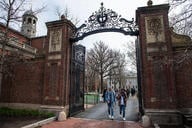You have /5 articles left.
Sign up for a free account or log in.
I'm currently putting the final numbers together for Greenback's greenhouse gas inventory. As on a lot of campuses, the last piece of the puzzle is commuting emissions, encompassing faculty, staff and students. I won't bore you with the mechanics of the process, but trust me -- it's been a lot of work.
Managing emissions is, at its heart, an engineering problem. How much you emit is determined not just by what you do, but also by the technologies you use to do it. The formulae for calculating emissions are well known -- the challenge is having the data to work the formulae.
When it comes to commuting, Greenback simply doesn't have that data. No shame there, most schools don't. But, when it comes to university-paid travel, or university-purchased paper, there's a hope that the process can be better centralized or automated, and that the data can be readily captured in future. Not so with commuting. Commuting decisions are inherently decentralized, and not obviously centralizable.
Anyways, I've been cranking the numbers, part of which is splitting the various populations (faculty, staff, students) by mode of travel: walkers, bus riders, car poolers, solo drivers. I knew, from the beginning, which mode would be most popular. You know, without thinking, which one it is. But what surprised me was the tiny percentage of faculty and staff who carpool. You can almost count them on the thumbs of one hand. Part-time students (grads or undergrad -- either one) carpool at a higher rate than do faculty or staff.
That got me to thinking.
Like a lot of campuses, Greenback sells parking permits by the academic year. Once purchased, there's no per-use charge. On-campus parking may not be convenient, but it's available. And it's effectively free (after the first use each year).
For part-time students, though, the cost of a parking permit is unattractive. Parking on the street is hard to find, but if you're willing to feed a meter, or park in a commercial lot or garage, you can save some money over the course of a semester, or even two. No sense paying for a five-day-a-week permit, if you're a one-day-a-week student.
The cost of per-use parking is by the car, not by the occupant. So, it you've got to pay (for example) five bucks to park, then carpool with another student in your class, and split the expense. I'll drive and buy the gas, you pay for the parking -- that sort of thing. (Not as good a deal for the driver as it used to be, but still better than paying for both!) Part-time student carpooling numbers aren't great, but they're about twice what the percentages are for faculty or staff.
I'm wondering why Greenback can't get the same incentive scheme going, for employees, as the market already provides for part-time students. It will take a little designing, but I'm going to propose that we institute a per-use parking charge. Cars with campus permits get reduced rates, but every day you decide not to drive, you save some money. Shelling out a couple or three bucks each morning has the effect of constantly reminding you about the choice you made. If the yearly permit fee goes down a lot and a small daily fee is introduced, the whole thing can be, as they say, "revenue neutral". But the dynamics change. The incentives change. And the behavior will be likely to change, as a result.
Too late to do it for next year, but Rome wasn't re-engineered in a day.

